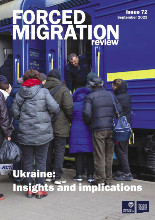Forced Migration Review (FMR) is the most widely read publication on forced migration – available in English, French, Spanish and Arabic, and free of charge in print and online.
It is published by the Refugee Studies Centre in the Oxford Department of International Development, University of Oxford. Through FMR, authors from around the world analyse the causes and impacts of displacement; debate policies and programmes; share research findings; reflect the lived experience of displacement; and present examples of good practice and recommendations for policy and action.
Keep up to date with FMR by joining our email list and by following us on Facebook, Twitter and LinkedIn.
Looking for subject-specific articles? Visit our Thematic Listings page or use Search to find articles from our full archive of back issues, many of which are also available as audio recordings.
Latest IssueUkraine: Insights and implications The war on Ukraine has caused forced displacement on a scale and at a speed not witnessed in Europe since World War II. This issue seeks to address questions that have arisen out of the crisis, reflecting on the lessons learned from the response and the implications for the international refugee and asylum system. |



